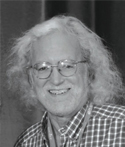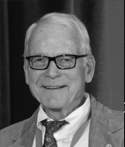Horse advocates, veterinarians noted for outstanding work








The American Association of Equine Practitioners recognized the 2016 recipients of several awards Dec. 3-7 2016 at its 62nd Annual Convention in Orlando, Florida.
Renowned airway surgeon and pioneer in laryngeal procedures Dr. Norm Ducharme (Montreal ’79) delivered the Frank J. Milne State-of-the-Art Lecture. His lecture, titled “Equine Upper Airways: Intersection of Evidence-Based Data, Emerging Discoveries, and the ‘Veterinary Art,’” focused on clinical applications of various upper-airway problems through examination of current research and emerging diagnostics and treatments. Included in his presentation were unpublished data on management of complications as well as advances in standing laryngoplasty.
Dr. Ducharme is the James Law Professor of Surgery at Cornell University College of Veterinary Medicine. He served as medical director of the equine and large animal hospitals at Cornell from 1990-2014, when the Cornell Ruffian Equine Specialists Clinic opened near Belmont Park in Elmont, New York.
His clinical and research interests center on sports medicine with an emphasis on equine upper-respiratory airway physiology at exercise. This encompasses respiratory flow and pressure mechanics, neuromuscular assessment of the neural control of airway patency, characterization of health status of the respiratory tract, and their influence on modifying or developing new surgical diagnoses and treatments.
After completing his residency in large animal surgery at Cornell in 1982, Dr. Ducharme served on faculty at the University of Guelph until 1986, when he joined the faculty at Cornell. He is a diplomate of the American College of Veterinary Surgeons and served on the ACVS board of regents from 1997-2000 and from 2004-2007.
Dr. Dennis Brooks (Illinois ’80), a practitioner known for his contributions to equine ophthalmology, received the Distinguished Educator (Academic) Award.
Over the course of his career, Dr. Brooks trained 31 equine ophthalmology residents, educated more than 3,400 veterinary students, and mentored 76 visiting veterinarians at the University of Florida.
Dr. Brooks completed his ophthalmology residency in 1984 at the University of Florida, where he also earned his doctorate in 1987. In 1990, he joined the university as an associate professor and ophthalmology service chief, achieving full professor status in 1998. He retired in 2015 as professor emeritus. He established BrooksEyes LLC, his equine ophthalmology consulting firm, in 2016.
Dr. Brooks is a founding member of the International Equine Ophthalmology Consortium and served as its president from 2011-2012. He is also a diplomate of the American College of Veterinary Ophthalmologists.
Dr. Glenn Blodgett (Texas A&M ’74) was presented with the Distinguished Life Member award for his leadership and exemplary service to the association during his 39 years as a member.
Dr. Blodgett was recruited in 1982 by the 6666 Ranch in Guthrie, Texas, to serve as resident veterinarian and horse division manager.
Considered an authority in equine reproduction, Dr. Blodgett put the 6666 Ranch at the forefront of the equine breeding industry by implementing advanced reproductive techniques with excellent results.
Beyond his daily practice, Dr. Blodgett has served on the AAEP board of directors and on its Racing and Ethics committees. Dr. Blodgett has been active in numerous other professional veterinary organizations, and he was the driving force behind the medication rules, policies, and procedures adopted by the Texas Racing Commission. Dr. Blodgett is the American Quarter Horse Association’s immediate past president and is a longtime director of the AQHA. He currently serves on the board of trustees of the American Horse Council.
Dr. William “Bill” Moyer (Colorado State ’70) was the recipient of the Distinguished Service Award.
He has advocated for the AAEP’s educational programs and was instrumental in recruiting up-and-coming academic leaders to become more involved with the association. He served as a director-at-large from 2001-2004 and as president in 2011.
Dr. Moyer is considered an authority on equine lameness issues. He retired from Texas A&M University College of Veterinary Medicine & Biomedical Sciences in 2015 as professor emeritus. During his time with the university, he served as head of the Department of Large Animal Clinical Sciences, associate director of the Center for Equine Business Studies, director of the Link Equine Research Endowment, and a member of the Veterinary Emergency Team.
Dr. Moyer completed his surgical residency at the University of Pennsylvania’s New Bolton Center in 1973 and spent 13 ears on faculty until he joined Texas A&M in 1993.
Jay Hickey Jr., who retired as president of the American Horse Council last year after 23 years in the position, received the George Stubbs Award for his contributions to the equine industry and support of equine health and welfare.
Hickey’s tenure included involvement with almost every major federal law and regulation concerning the equine industry. Under Hickey’s direction, the AHC coordinated economic impact studies at the state and national levels and became a driving force behind the formation of the Congressional Horse Caucus, the Congressional Cavalry, the Unwanted Horse Coalition, and the AHC marketing alliance known as Time to Ride, which seeks to increase horse ownership and participation. In recent years, Hickey was a leading voice for establishing the Equine Disease Communication Center.
Michael Blowen, an advocate of Thoroughbred racehorse aftercare, received the Lavin Cup.
In 2003, Blowen founded Old Friends Thoroughbred Retirement Center in Georgetown, Kentucky, to provide dignified retirement for racehorses. The center cares for more than 160 horses across three states. Old Friends is the only Thoroughbred rescue facility known to accept stallions.
More than 20,000 visitors and local tour companies visit Old Friends each year to see former winners such as 1997 Kentucky Derby and Preakness Stakes winner Silver Charm and 2002 Belmont Stakes winner Sarava. By promoting these celebrated racehorses through a campaign of education and tourism, Old Friends brings awareness to all retired Thoroughbreds and horses in need.
The Ohio State University doctoral candidate Dr. Katarzyna Dembek (Warsaw ’05) received the Equus Foundation Research Fellowship for her research into how the dynamics of hypothalamic, pituitary, and adrenal hormones relate to severity of disease and mortality in newborn foals.
Dr. Dembek has made several clinical discoveries, including how an increase in the number of adrenal steroids in foals who develop sepsis is directly proportional to severity of disease and likelihood of death. She also demonstrated that foals with adrenal endocrine failure are likely to die within a short period after admission. In addition, Dr. Dembek helped develop an app called FoalScore, which estimates the probability of sepsis in foals and their survival.
She completed her master’s in veterinary clinical sciences and her equine medicine residency in 2012, both at Ohio State. She is a diplomate of the American College of Veterinary Internal Medicine.
Texas A&M University doctoral candidate Dr. Canaan Whitfield-Cargile (Georgia ’06) was honored as the AAEP Foundation Past Presidents’ Research Fellow for his research examining the role of gastrointestinal microbiota in healing in horses.
Changes in equine GI microbiota have been associated with chronic laminitis, colitis, and colic. Dr. Whitfield-Cargile’s research examines the role of equine GI microbiota and their metabolites in three medical conditions in horses: nonsteroidal anti-inflammatory enteropathy, Clostridium difficile–associated enterocolitis, and intestinal anastomotic leakage.
Dr. Whitfield-Cargile completed his large animal surgery residency at Texas A&M. He briefly worked in equine private practice before joining the university’s College of Veterinary Medicine & Biomedical Sciences as an assistant professor of large animal surgery. He is a diplomate of the American College of Veterinary Surgeons and the American College of Veterinary Sports Medicine and Rehabilitation.